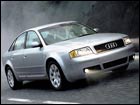
NEW YORK (Money Magazine) -
Alan Briker, a 57-year-old internist in Westwood, N.J., may give his patients all the attention in the world, but when it comes to his cars, he's got AADD, automotive attention deficit disorder. That's why he loves leasing.
His new 2002 BMW 330i is the seventh car he's leased for himself and his wife in 12 years. At first, he explains his habit by saying his accountant told him leasing was a good idea for tax purposes. But then the truth comes out. "I just get bored," he says.
Dr. Briker is one of the many novelty lovers who make leasing luxury cars (selling for $30,000 or more) so popular. About 56% of luxury cars are leased, compared with about 26% of all cars.
The plus side
The appeal of leasing is simple: You put less money down and make smaller monthly payments than you would if you were buying. You usually turn in the car before the warranty ends, so you don't need to worry about expensive repairs. And you won't have to sell the car when you want another one.
With luxury cars, there's also the aspiration factor. Quite simply, in the short term, it's easier to afford a more expensive car when you lease. Take a Lexus GS430: As of late May, purchasing one at a list price of $47,980 (we got a few extras) through Toyota Finance would run $1,327 a month for three years with a $5,000 down payment. A 36-month lease, also financed by Toyota, would cost $807 a month with $1,907 down. The cash-flow advantages are obvious.
And if you decide to keep the car, you can buy it -- and you can negotiate the price. Leases are based on your paying for the difference in a car's value from the time you drive it off the lot to the day you turn it back in (plus interest and a little profit), when it's worth the same as any other used car. Although you will agree to a buyout price (termed residual value) when you sign the lease, you can bargain when it's turn-in time. Right now, car companies that offered overly generous lease deals in years past are facing a used-car glut. It's a buyer's market.
And yes, if you use your car for business, leasing offers tax advantages. "When you buy, you have to depreciate a car over several years," says Lynn Ballou, a certified financial planner in Lafayette, Calif. "When you lease, you get to deduct most of the lease payment." That said, Ballou agrees with the conventional wisdom that in the long run leasing is more expensive than buying, because buying gives you equity and eventual freedom from payments if you hang on to your car.
The nuts and bolts
Car leasing can be one of the most jargon-filled experiences imaginable. Reading an Internet leasing glossary is a must. "Capitalized cost," for example, is simply the price of the car when it's new. "Subventing the money factor" means that the car company is subsidizing the interest rate, or money factor, to make the offer more attractive. Ask the dealer to translate the money factor into an annual percentage rate for you.
Jargon aside, there are a few points any consumer should consider.
Look for special offers. Fred Uno, general manager of CD1, the financing arm of CarsDirect.com, says that the most aggressive deals can be found when a car maker is phasing out a particular model, as Mercedes is doing now with its E-class cars, which are due to be replaced late this summer.
Negotiate to lower the price of the car before telling the dealer you want to lease. Then structure the lease based on the agreed-upon price. That reduces the difference between the original price and the residual value.
Aim to lease for about three years. "A three-year lease takes you about 36,000 miles, and that's a turning point in a car's life," says Philip Reed, consumer-advice editor for auto website Edmunds.com. At that point, a car's brakes and tires are ready to be replaced. In many cases, the warranty is winding up too.
Be realistic about how much you'll use the car. Driving beyond the allotted mileage (usually 10,000 to 15,000 miles a year) will incur penalty costs, typically 10 to 20 cents per mile. Try to negotiate to increase the allotment of miles. Here's why: If you commute 20 miles each way to your office, five days a week, you'll eat up a 10,000-mile allotment. Every additional trip--from picking up groceries to a weekend in the country--will rack up charges.
Use the Internet to compare financing costs. Unless you're taking a promotional lease from an auto manufacturer, you may find the best deals through independent finance companies. One route to finding good value is through leasing websites.
In fact, Reed suggests visiting car dealerships only for a closeup look and a test drive. After that, use the phone or the Internet. Start at a site that offers exhaustive information about cars, such as Edmunds.com or Autobytel.com. Then try IntelliChoice.com or LeaseGuide.com, which include such tools as a glossary, a lease calculator and dozens of useful strategy tips. CarsDirect.com offers a Buy vs. Lease calculator, as well as a Rebates and Incentives page that displays lease deals in your area.
When you're ready to talk to a dealer, do it by phone. Many larger dealerships now have Internet departments to handle online business. Figure out how much you're willing to pay based on information you find online, then call the dealership's Internet manager, who (unlike most salespeople) is frequently authorized to make a best offer. And let managers know you're talking to other dealers. Says Reed: "Competition always shakes out the best price."

|

